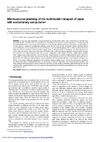Identificador persistente para citar o vincular este elemento:
https://accedacris.ulpgc.es/jspui/handle/10553/69495
| Título: | Minimum-cost planning of the multimodal transport of pipes with evolutionary computation | Autores/as: | González Landín, Begoña Winter Althaus, Gabriel Emperador Alzola, José María Galván González, Blas José |
Clasificación UNESCO: | 120601 Construcción de algoritmos 120613 Ecuaciones diferenciales en derivadas parciales 120704 Distribución y transporte 1206 Análisis numérico |
Palabras clave: | Minimum-cost planning Multimodal transport problem Evolutionary computation |
Fecha de publicación: | 2009 | Publicación seriada: | International Journal for Simulation and Multidisciplinary Design Optimization | Resumen: | Every day many kilometres of European highways are blocked by traffic jams. Congestion on roads and at airports adds the EU's fuel bill with a corresponding rise in pollution levels. In short, our present patterns of transport growth are unsustainable. One way of easing road congestion is to develop the efficient end-to-end movement of goods using two or more forms of transport in an integrated transport chain. We will focus on the multimodal transport problem that involves finding the most economical route in the distribution of cast iron ductile piping with or without mortar joint, both of different diameters and from different possible supply points to different points of destination over three transport networks, road, rail and sea, which may have routes in common. The orders are made for quantities in linear metres of pipes. The economic cost of the transport on the various routes is dependent on the number of lorries, freight wagons and platforms required, and as these quantities must be obviously integer numbers. In practical applications the search space is dimensionally very high, often there exist attractors into the search space due to the existence of multiple global optimum solutions, the cost function has discontinuities, many constraints, etc. The problem that has to be resolved is of great complexity, even using evolutionary algorithms. Our experience gained working several years in this optimization problem is described in this paper, to highlight that there is a need using evolutionary algorithms with certain learning ingredients and using strategies that progressively impose with more and more severity in the evolutionary optimization process the real scenario of the complex problem to get convergence to the global optimal solutions and simultaneously to obtain low computational cost total. | URI: | https://accedacris.ulpgc.es/handle/10553/69495 | ISSN: | 1779-627X | DOI: | 10.1051/ijsmdo/2009015 | Fuente: | International Journal for Simulation and Multidisciplinary Design Optimization [ISSN 1779-627X], v. 3 (3), p. 401 - 405 |
| Colección: | Artículos |
Visitas 10
82
actualizado el 10-ene-2026
Descargas
76
actualizado el 10-ene-2026
Google ScholarTM
Verifica
Altmetric
Comparte
Exporta metadatos
Los elementos en ULPGC accedaCRIS están protegidos por derechos de autor con todos los derechos reservados, a menos que se indique lo contrario.
